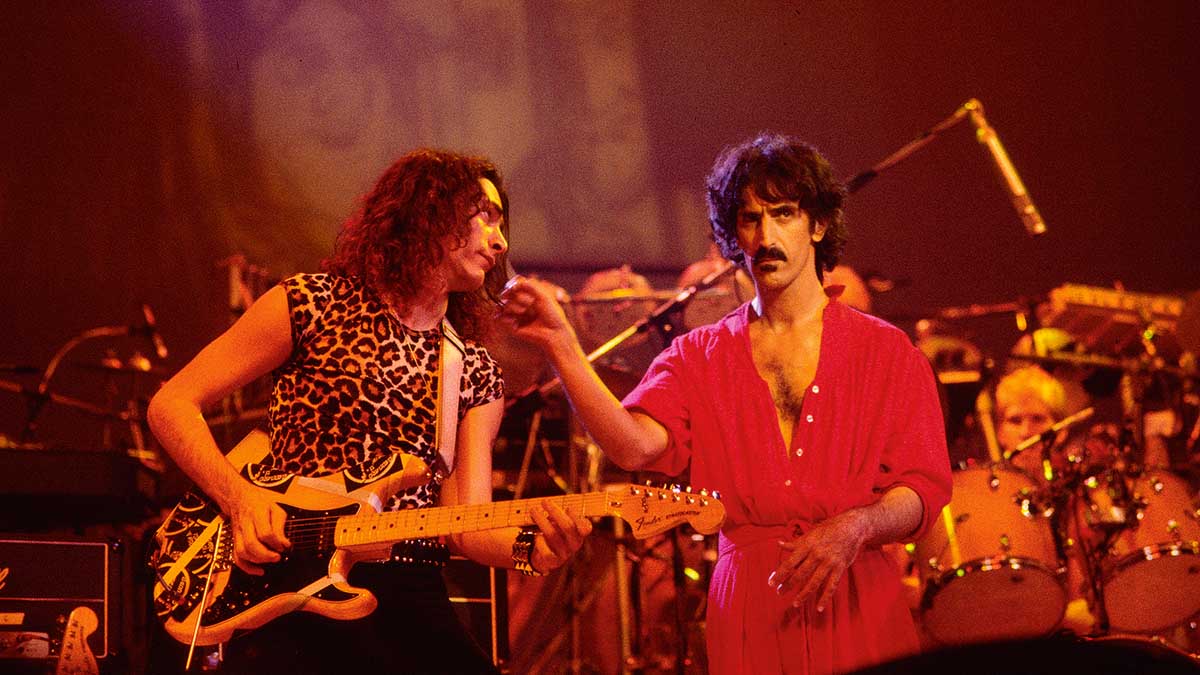Steve Vai reflects on working with Frank Zappa: "If you didn’t have the goods, you didn’t last. Frank expected everybody to rise to the occasion"
The virtuoso details his 'stunt guitar' days spent playing, transcribing and recording the most difficult compositions in Frank Zappa's oeuvre

Steve Vai started working for Zappa at the age of 18. In the beginning he was transcribing Zappa’s music, some of which was published in The Frank Zappa Guitar Book (Munchkin Music, 1982), but in the autumn of 1980 he became a fully paid-up member of Zappa’s recording and touring band and can still remember the level of culture shock that was to ensue…
How did you get to know Zappa?
“I was so innocent and naïve. I was a kid that grew up in a teenage bedroom on Long Island listening to the progressive rock music of the 70s, but had an interest in composition from a very early age. And I discovered Frank. When I moved out to California, it was a bit of a shock. It was so exciting and so interesting. And then I got an apartment right down the street from Frank, so I was constantly in the Zappa world. A week later, I just started going up to the house and then that was it, you know?”
Did you go straight into recording sessions?
“Well, that’s the interesting thing about Frank. When you go up to the studio and you’re a musician and there’s something that you can do that he finds useful in his music, you just start recording all sorts of things. Then records start coming out and sometimes they’re not necessarily in the order that you worked on things.
“So, for instance, when I first started going up to the house, Frank had me recording a few pieces of music that were extremely difficult. One of them was Theme From The 3rd Movement Of Sinister Footwear.
“Then the first album I started to record with Frank was You Are What You Is. I was all over that record and I thought, ‘Well, great, that’s going to be the next record that comes out.’ But the next record that actually came out was Tinseltown Rebellion, which was from the first fall 1980 tour that I did. And then You Are What You Is came out after that. So you just never knew with Frank.”
Get The Pick Newsletter
All the latest guitar news, interviews, lessons, reviews, deals and more, direct to your inbox!
He was renowned for being very tough in the rehearsal room. Did you experience that?
“The level of excellence that you needed to be at was such that if you didn’t have the goods, you didn’t last. And Frank expected everybody to rise to the occasion. One of the brilliant things about Frank was he had the ability to totally intuitively read your potential. And each musician that he hired for his band had to have something that they could do that was somewhat extraordinary.
“You had to be a great singer or a great player, whatever it was that you did. That’s what he expected from you. He wouldn’t expect you to do things that you couldn’t do because that wouldn’t work for him. So it didn’t work for you. So ‘tough’ is an interesting word to apply to Frank. He was demanding, but he didn’t demand things that you couldn’t do.”
’Tough’ is an interesting word to apply to Frank. He was demanding, but he didn’t demand things that you couldn’t do
Personally, what do you feel he drew out of you as a musician?
“Well, first I transcribed his music so he put me in really deep, transcribing all these abstract guitar solos and drum parts for him. For some reason, this was something that was just very organic for me. And then, as far as playing obtuse melodies on the guitar that aren’t very natural for conventional guitar players, I was pretty good at that because in my mind I loved the idea of playing things that were very, very difficult – and Frank had a boatload of that stuff. So he would write music for an instrument like the piano that wouldn’t fall on the guitar in any natural way, but I somehow figured out ways to play it.
“One of the things I was able to do, which I think Frank was able to take advantage of, was play some of those very difficult melodies that in the past he didn’t have guitar players play.”
You played on possibly the most technically difficult of all Zappa’s pieces, The Black Page, earning you the title of ‘Stunt Guitarist’ in the band.
“I think he was just interested to see how far he could take me with playing crazy stuff on the guitar. But the things that I did with him that I think he got the biggest kick out of was The Jazz Discharge Party Hats or The Dangerous Kitchen or Moggio or RDNZL or Drowning Witch. These are all pieces of music that just had an uncanny type of guitar expectations.”
Is there a moment on stage that will stay with you for ever, during your time touring with Frank?
“There are so many. The first show of the tour I did with Frank in 1980, he’d never really had somebody playing these types of melodies on the guitar. He had given me the melody to this song, Montana, and now you get guys like Mike Keneally and Dweezil [Zappa] and that’s a piece of cake.
“It’s not a problem for these guys, but back then nobody was doing that stuff. And I’ve seen Frank in a bad mood. If he heard one mistake, one tiny little mistake, something he didn’t like, he threw the whole song out. And if it’s the same person who made the mistake more than two times in a row, they were thrown out of the band.
“Well, we play Montana and there’s that interlude in the middle and I just nailed it, you know? I just freakin’ nailed it. And he stopped the show, walks up to me in front of the audience and he says to the mic, ‘Not bad, sport.’ And then we kick in again. Now, I’ve seen him stop the band for other reasons that weren’t as friendly as that, trust me. So that was a surprise.”
“There’d been three-minute solos, which were just ridiculous – and knackering to play live!” Stoner-doom merchants Sergeant Thunderhoof may have toned down the self-indulgence, but their 10-minute epics still get medieval on your eardrums
“There’s a slight latency in there. You can’t be super-accurate”: Yngwie Malmsteen names the guitar picks that don’t work for shred
![A black-and-white action shot of Sergeant Thunderhoof perform live: [from left] Mark Sayer, Dan Flitcroft, Jim Camp and Josh Gallop](https://cdn.mos.cms.futurecdn.net/am3UhJbsxAE239XRRZ8zC8.jpg)









